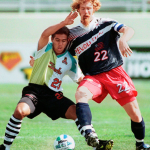
What will remain of Italian soccer?
The defeat against North Macedonia could become even more dramatic if mishandled in the aftermath

March 25th, 2022
The day after one of the worst defeats in the history of Italian football, comparable perhaps only to the defeat against North Korea in 1966 or the play-off lost to Sweden for the last World Cup, is, as always, the day of summary judgments, of commissions of inquiry unrolled on social networks and in the press. Everyone agrees that it is necessary to start from scratch, everyone seems to have the perfect recipe to fix Italian soccer. They usually start from soccer schools to national quotas in professional leagues - the mantra "too many foreigners" repeated almost out of boredom - and then arrive at accusations against players who earn too much, who think only of social media or fashionable clothes.
These are specious accusations, launched in an attempt to give a rational explanation to a game that has little logic. It would be enough to point out that France at the moment has one of the most competitive and deepest selections in the world, despite much discussion about how the Ligue 1 is not a training league or how its best players are particularly active on social networks and in their self-branding. At the same time, France itself came out badly from a European Championship that we lifted to the skies at Wembley just eight months ago, beating some of the continent's best teams.
As someone said, soccer is strange and sometimes very little is needed (like a penalty scored or missed) to totally change the trajectory of a group, of a coach, of an entire country. Few sports seem to be tied as if by a spell to invisible forces as much as soccer, and the feeling was that Roberto Mancini's National Team had lost the favor of the gods. Certainly it is unthinkable to think of having been eliminated from the World Qualification by a nation that barely comes close to the population of Rome and did not even have its two best known players, also thanks to their militancy in Serie A, such as Goran Pandev and Elif Elmas.
But already the idea of having to play the qualification in Portugal against Cristiano Ronaldo and his teammates already made us start out terrified and beaten, as if the confidence earned to the sound of great performances and record-breaking unbeatability had evaporated. When we feared the Lusitanians, Trajkovski's goal, who was at home in Palermo, condemned us to an early ending, as unexpected as it was cruel. Italy lost its third match in four years, it lost it at the first goal of the opponents after ninety minutes of play and this was enough to skip the second consecutive World Cup, this time with the mockery of playing as European champions.
Now to find a scapegoat for a disaster of such dimensions is also too convenient and to condemn a movement that, among many unquestionable difficulties, has managed to crown a magical 2021 for Italian sport unfair. Perhaps the truth is in the middle, Italy is no longer the football powerhouse that we remember from the grainy photos of the 70's or from the VHS's consumed during the various editions at the turn of the millennia, but a strong team that can have high peaks and suffer disastrous falls.
Time changes and the world moves on, enlarging its sporting boundaries to create a competitive landscape in which, if it is very difficult to establish oneself, it is almost impossible to do so. And the only way to build winning cycles capable of crossing more than a single major international event is, paradoxically, to divide processes and results. In other words, to avoid the very Italian attitude of destroying everything good that has been built up to now, as if all the innovations introduced were failures.
The greatest obstacle is the opposite: we have remained crystallized, basking for too long in a superiority of tradition and know-how, convinced that this would be enough to remain on top. Instead of innovating, we continue to look backwards, instead of modernizing, we multiply honorary positions and instead of building new structures, we bind the obsolete ones to very narrow rules. Roberto Mancini lost against North Macedonia when he failed to live up to the creed that has governed his cycle in the national team up until now, the creed that has led him to impose his ideas of play and men. On the other hand, by going on the defensive, always choosing his loyal players even if they are clearly out of shape and out of role, he betrayed himself first and then all the Italian fans, who will have to wait another four years to return to dream of the World Cup.












